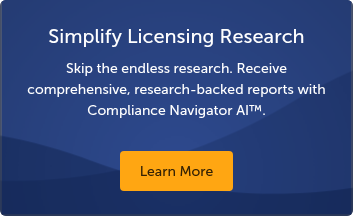
Controlled Substance Registrations for Professionals
Meet state and federal registration requirements related to controlled substances.
About Registration
In addition to the professional licenses issued to healthcare professionals, many states require individuals who handle or prescribe controlled substances to also complete a controlled substance registration. State controlled substance registration requirements often apply to physicians, pharmacists, dentists, veterinarians, advanced practice nurses, researchers who work with controlled substances, and a variety of other medical professionals.
States without a separate controlled substance registration requirement typically require individuals who handle controlled substances to register for the state prescription monitoring program (PMP). PMPs allow states to collect data on drug prescribing and dispensing and help monitor for abuse.
At the federal level, many of the same individuals required to register for state-issued controlled substance registrations must register with the Drug Enforcement Administration (DEA) under the United States Controlled Substances Act.
Initial Application Process
After meeting education and experience requirements, applicants can begin the examination process by applying for approval with the Council for Interior Design Qualification (CIDQ). After approval, applicants will need to schedule and pass the three sections of the exam.
After passing the exam, applicants typically apply for registration through the state licensing board. In some cases, applicants must file an application with the state board prior to taking the NCIDQ.
Before applying for a controlled substance registration, applicants must have an active relevant professional license. Individuals who need to apply for both a state registration and a federal DEA registration will typically need to apply for the state-issued registration first.
Applications requirements vary by state, but many applications ask for the following:
- The applicant’s professional license number
- Which schedules of drugs the applicant will work with
- An application fee
- Business entity information
- The applicant’s NPI number
- Criminal and disciplinary history of the applicant
Renewal Requirements
After obtaining the required licenses and registrations, healthcare professionals must keep up with their professional license continuing education and renewal requirements along with state and federal controlled substance registration renewal requirements. Controlled substance registrations usually need to be renewed on an annual or biennial basis, but some states link controlled substance registrations and professional licenses so they renew at the same time.
Keeping up with each state’s requirements, tracking renewals, and submitting the applications on time is critical to avoiding penalties. Dedicated compliance software and services can help you keep track of varying jurisdiction requirements and relevant updates to state laws.
Explore Licensing in Your State:
Click on a link below to view licensing information in your state.
Controlled Substance Registration - In addition to a pharmacy license, controlled substance registration registration is required in many states for pharmacies that distribute controlled substances.
NABP (National Association of Boards of Pharmacy) - Host a variety of programs and resources relating to pharmacist and pharmacy licensure and examination.
Pharmacist in Charge - A licensed pharmacist designated by a pharmacy to act as the party responsible for compliance with regulations.
VPP (Verified Pharmacy Program) - A program run by NABP that allows state boards to share information and more easily register out-of-state pharmacies.



